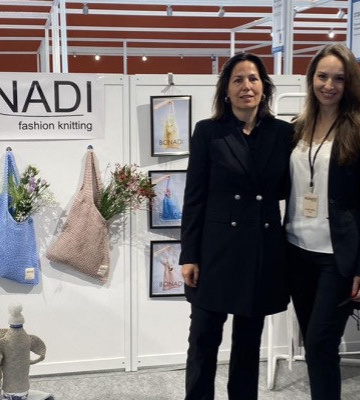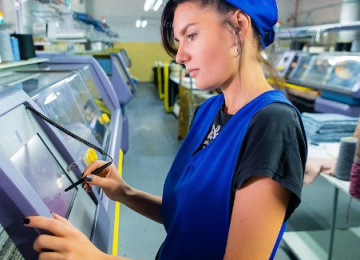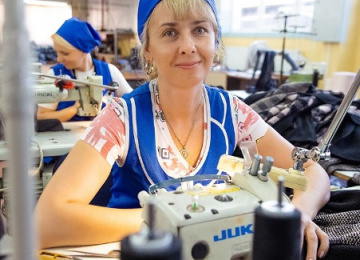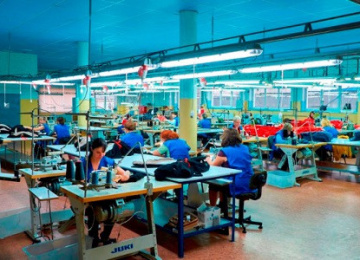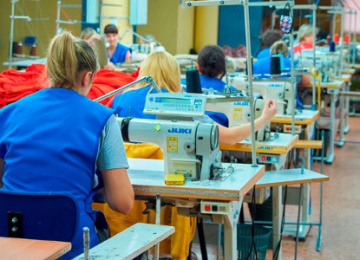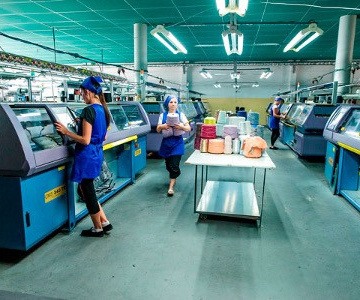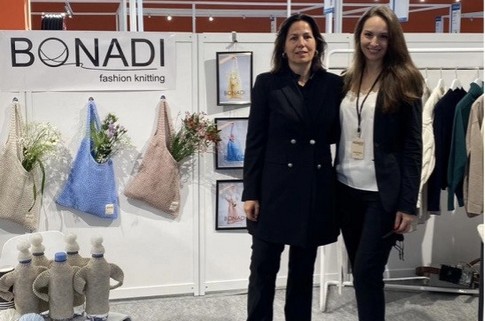
A knitwear factory in Belarus has partnered with luxury clothing brands through the “Ready to Trade - an EU4Business Initiative” project, allowing this small country to boast knitwear that meets all European quality standards. Yet production is cheaper, and delivery takes much less time than from China.
“We don’t have the usual high attrition for this industry, everyone likes their job”
Although officially the Bonadi factory was set up in 2014, its history began in 2007. Back then, it was a small wholesale knitwear maker for the Russian market. A few years later, the business was regrouped and renamed to Bonadi in 2014.
Anastasia Pestis joined the company as a foreign economic expert. Her diligence and deep interest in each stage of production helped her grow to head the company by then.
“At first I was just another trade specialist, but I was curious about the whole process, not just purchasing and customs clearance,” she recalls. “Besides, to understand which equipment and raw materials were suitable, I had to understand how they actually worked in production. I would spend hours asking knitters and other workers about their craft to figure out how it all could be used efficiently and—just like that—I educated myself about the whole process.”
According to the factory director, knitwear is a very expensive business, and loans are issued at very high interest rates in Belarus, compared to the rest of Europe.
“Firstly, equipment is quite pricey: one new knitting machine can cost €100,000, and we have 17 of them!” explains Anastasia. “Secondly, margins aren’t high in our own production, and the technology needs constant upgrading. Thirdly, it’s hard to find designers who can draw on textile and map a print in a special program. These qualifications are rare in Belarus, so we have to look for programmers and train them for at least six months. At the end of the day, it is them who must set up each of the 700 needles to make a given pattern or a given weave density.”
Today, 91% of the Bonadi team are women. Anastasia calls them her second family, because everyone stands for each other.
“Maybe nature gave these women a greater sense of responsibility,” she says. “We aren’t the rolling stones type, rather very industrious and responsible. And I also feel responsible for them and for their comfort at work. I love the people I work with and I'm really proud of them. We don’t even have the usual high attrition for this industry, everyone likes their job. In general, knitwear draws in those who like the process. This is pure magic, where completely different canvases can be made from one sketch, a bobbin of thread and different machine settings. We’re interested in client’s feedback and focused on customer satisfaction.”
“Cheaper than Europe and faster delivery than from China”
All Bonadi’s attempts to find premium quality yarn in Belarus have failed, so this is imported.
“I love my country, but it is next to impossible to buy natural threads with unusual compositions here, just like in Russia,” says Anastasia. “The best you can find is 50% wool and 50% acrylic. In addition to this, it is difficult to find the right colours: of 40 samples, two might be in stock, you have to order very high volumes, and delivery timelines are unclear. So we use Italian, German, French threads and cashmere.”
Today, the factory also makes ready-made clothes for women, men and children.
“We don’t sell to individuals, but, unlike many other manufacturers, we aren’t only focused on large lots,” says Anastasia. “A typical order is up to 300 pieces of a single model. It turns out faster to purchase a ready-made order from us than from China, it’s cheaper than European production, yet the quality is at the same level. At the beginning, we struggled to prove our worth, but now we can show our models for GUILLE, Alessandro Borelli, Alena Goretskaya, BAON, and 2MOOD. It now takes us 1-2 months from drawing the layout to shipping the final product.”
Still, you won’t find a large product catalogue on the factory website.
“We have confidentiality agreements with some of our customers so we can’t display their samples, because they label our fabric as their own,” admits Bonadi’s boss.
When Bonadi started making collections for customers, sometimes they recycled leftovers of premium yarn not to overspend on raw materials. They put them to good use in their own collections of mid-range and above-average priced models.
“The EU4Business Ready to Trade project helped us in this endeavour,” acknowledges Anastasia Pestis. “We learned about it through cooperation with the EBRD, which supports women in business. We enrolled in Ready to Trade, and a project representative came to us and assessed the scale of production and how RTT might help us. Then a consultant from the Netherlands audited everything, from documents in the accounting department to the production shop, how safety rules were observed, what technologies we used, how we treated employees, what might be improved in production, and much more. That’s how they nominated us to benefit from the project.”
“Production volume went up 10-15%, and online sales jumped 45% in 2021”
To prosper, you need to learn from the best in an industry. That’s why Bonadi regularly visits other production facilities and exhibitions in other countries and tries to adapt world technologies to Belarusian conditions.
“Italians are the rock stars of knitwear production,” says Anastasia. “They taught us the technology of coupon knitting, when different pieces of fabric cut from the same fabric are not simply sewn together, but each of them is knitted separately and then connected to each other with a special machine.”
In 2021, Bonadi became an exhibitor at Première Vision with the support of ITC, CBI and EU4Business, and received a lot of attention from European clothing manufacturers.
“The EU financed our involvement in the exhibition because we could not afford it on our own,” says Anastasia. “We found at least 10 new clients, many of them small European companies that don't need batches huge enough to order from China.”
The Ready to Trade project also helped the factory with offline and online consultations in various areas, from marketing to making a website. And just like that, the company went from offline to online.
“Since the project, we have increased production 10-15%, and thanks to the seminars, our online sales in 2021 alone increased by 45%,” reports Anastasia. “For us, it’s been a huge push in development.”
Ready to Trade is an EU4Business Initiative project implemented by the Centre for the Promotion of Imports from Developing Countries (CBI) and the International Trade Centre (ITC).
